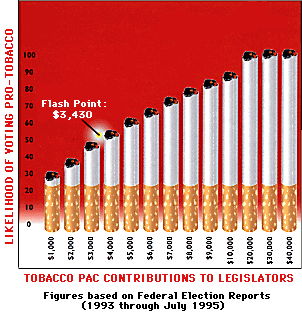
In the past year, only one U.S. House proposal took on the tobacco industry–and it lost. Last July, the House defeated a proposed $23 million cut in subsidies to tobacco farmers. Opponents claimed Washington gives crucial help to the farmers.
Of course, tobacco also provides crucial help to Washington politicians. Greg Boller, a political marketing professor at the University of Memphis, and his students, analyzed donations from the five top tobacco PACs (R.J. Reynolds, Philip Morris, Brown & Williamson, U.S. Tobacco, the Tobacco Institute) during the 31 months before the vote. The PACs gave an average of $6,138 to opponents of the measure, but only $1,645 to supporters.
They identified a “trigger point”–where the money seemed to sway legislators against the tobacco measure–of $3,430. Following their formula, donations needed to exceed $14,000 for the odds of winning a legislator’s favor to reach 90 percent.















